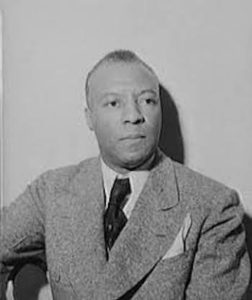
A. Phillip Randolph
*On this date in 1889, A. Philip Randolph was born. He led the Black Civil Rights, American Labor Movement, and Socialist Political Party.
Asa Phillip Randolph was born in Crescent City, Florida, the second son of the Rev. James William Randolph, a tailor and minister in an African Methodist Episcopal Church, and Elizabeth Robinson Randolph, a skilled seamstress. In 1891, the family moved to Jacksonville, Florida, which had a thriving, established black community.
From his father, Randolph learned that color was less important than a person's character and conduct. From his mother, he learned the importance of education and of physically defending oneself against those who would seek to hurt one's family, if necessary. Randolph remembered vividly the night his mother sat in the front room of their house with a loaded shotgun across her lap while his father tucked a pistol under his coat and went off to prevent a mob from lynching a man at the local county jail.
He and his brother, James, were good students. They attended the Cookman Institute in East Jacksonville. He excelled in literature, drama, and public speaking; he played on the school's baseball team, sang solos with the school choir, and was valedictorian of the 1907 graduating class. After graduation, Randolph worked odd jobs and devoted his time to singing, acting, and reading. Reading W. E. B. Du Bois' The Souls of Black Folk convinced him that the fight for social equality was most important.
Randolph was barred from all but manual jobs in the South by discrimination. He moved to New York City in 1911, where he worked odd jobs and took social sciences courses at City College. There, he helped organize the Shakespearean Society in Harlem. With them, he played the roles of Hamlet, Othello, and Romeo, among others. Randolph aimed to become an actor but gave up after failing to win his parents' approval.
In 1913, Randolph courted and married Mrs. Lucille Campbell Green, a widow, Howard University graduate, and entrepreneur who shared his socialist politics. The couple had no children. In New York, Randolph became familiar with socialism and the ideologies the Industrial Workers of the World espoused. He met Columbia University Law student Chandler Owen, and the two developed a synthesis of Marxist economics and the sociological ideas of Lester Frank Ward, arguing that people could only be free if not subject to economic deprivation.
At this point, Randolph developed his distinctive form of civil rights activism, emphasizing the importance of collective action for Black people to gain legal and economic equality. To this end, he and Owen opened an employment office in Harlem to provide job training for southern migrants and encourage them to join trade unions.
1925 he organized and led the Brotherhood of Sleeping Car Porters, the first predominantly African American labor union. In the early Civil Rights Movement and the Labor Movement, Randolph was a voice that would not be silenced. Randolph's belief in the power of peaceful direct action was inspired partly by Mahatma Gandhi's success against British occupation in India. His continuous agitation, with the support of fellow labor rights activists against unfair labor practices with nonwhites, eventually led President Franklin D. Roosevelt to issue Executive Order 8802 in 1941, banning discrimination in the defense industries during World War II. The group then successfully pressured President Harry S. Truman to issue Executive Order 9981 in 1948, ending segregation in the armed services.
Randolph finally realized his vision for a March on Washington for Jobs and Freedom on August 28, 1963, which attracted 200,000–300,000 to the nation's capital. The rally is often remembered as the high point of the Civil Rights Movement, and it did help keep the issue in the public consciousness. However, when President Kennedy was assassinated three months later, Civil Rights legislation was stalled in the Senate. It was not until the following year, under President Lyndon B. Johnson, that the Civil Rights Act was finally passed. In 1965, the Voting Rights Act was passed. Although King and Bevel rightly deserve great credit for these legislative victories, the importance of Randolph's contributions to the 20th-century American Civil Rights Movement is significant. Randolph died in his Manhattan apartment on May 16, 1979. He had a heart condition and high blood pressure for several years before his death. He had no known living relatives, as his wife had died in 1963, before the March on Washington.